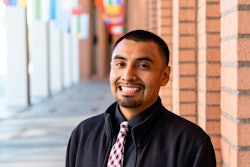Title: Assistant Professor in the Center for the Study of Higher Education at University of Arizona.
Tenured: No
Age: 35
Education: B.A., Journalism; M.A., Ph.D.
Career mentors: Dr. Ozan Jaquette, UCLA; Dr. Gary D. Rhoades, University of Arizona.
Words of wisdom/advice for new faculty members: “Research should be serving a greater good. Doing research for the sake of research is great, but it's even better when we are able to leverage that into making some type of transformative change.”
Growing up in South Tucson's predominantly Mexican and Central American community, Dr. Karina Salazar never imagined becoming a professor. Like many first- Dr. Karina Salazar
Dr. Karina Salazar
But a serendipitous journey of studying journalism would eventually lead her to become one of higher education’s most innovative researchers examining how university recruitment practices affect access for underserved students.
As a top student at her high school who excelled in AP courses, Salazar earned a full scholarship to the University of Arizona. Though she initially pursued STEM, based on her strong mathematics performance, she soon discovered her talent for writing and switched to journalism. This pivot proved fortuitous, as her education beat coverage exposed her to critical issues around K-12 funding and controversial policies like the ban on Mexican American Studies in Tucson schools.
“I began to become really interested in education inequities, educational policy, both at the state and federal level,” Salazar explains. With print journalism facing industry decline as she approached graduation, she decided to pursue a master’s in educational policy while plotting her next move. The research component captivated her, leading to doctoral studies and eventually a faculty position at her alma mater.
Now in her fifth year as an assistant professor at the University of Arizona, Salazar has emerged as a leading voice challenging dominant narratives about Latino student enrollment in higher education. Where national discourse often attributes disparities to supposed deficits in student achievement or family values, her groundbreaking research examines how universities’ own enrollment management practices perpetuate inequitable access.
Her work on what she terms “recruitment redlining” has revealed how universities systematically focus recruiting visits on affluent white communities while circumventing Black and Latino neighborhoods. More recently, she has begun investigating the largely unexamined role of third-party vendors who sell student contact information to universities for recruitment purposes.
“The primary way colleges identify, and recruit prospective students is by purchasing their contact information from student list vendors,” Salazar explains. Her current research, supported by a prestigious National Academy of Education/Spencer Foundation postdoctoral fellowship, explores how algorithmic products used in this process may encode discriminatory patterns that undermine institutional efforts at equitable recruitment.
This work has taken on new urgency following the Supreme Court's decision restricting race-conscious admissions. While the Biden administration has highlighted targeted recruitment as a potential alternative strategy for maintaining diverse enrollments, Salazar's findings suggest current practices and tools may be poorly suited to advance these goals.
For Salazar, the opportunity to conduct this research while remaining rooted in her home community represents a powerful alternative to traditional academic career paths that often require multiple relocations. She credits her department for recognizing how cultural values around community connection shape the aspirations and contributions of scholars of color.
“We tend to think about research, teaching and service as very distinct from one another," she says. “But particularly coming from a Latinx perspective and ways of knowing, these things are not different for me. They're very interrelated and interwoven and the central thread that weaves together these three roles is my deep commitment to my home community.”
Drs. Nolan L. Cabrera and Jenny J. Lee—professors of higher education at the University of Arizona and past Diverse Emerging Scholars—said that Salazar is a rising star in the field of Education.
“She is charting new and innovative ways of addressing persistent issues of structured inequities,” they wrote in the letter nominating Salazar. “However, she is not content with simply identifying a problem. Dr. Salazar also wants to provide solutions.”
This integration of scholarly work and community impact shapes the advice Salazar offers to emerging researchers. With tenure review approaching next year, Salazar exemplifies a new generation of scholars working to transform both access to higher education and the culture of academia itself. Her success challenges conventional wisdom about academic career progression while demonstrating the power of research grounded in lived experience and community knowledge.
Through partnerships with local school districts and efforts to translate findings for public impact, she models ways of making scholarly work accessible and relevant to the communities it concerns. As debates over college access and diversity continue to evolve, Salazar's innovative research promises to reshape understanding of how institutional practices and industry structures influence educational opportunity.





















